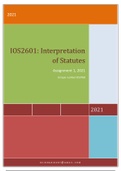2021
IOS2601: Interpretation
of Statutes
Assignment 1, 2021
Unique number:853768
2021
DEJONGRIBERY@GMAIL.COM
, IOS2601- Interpretation of Statutes
Assignment 1
Unique n#: 853768
Question 1:
1.1 List the documents that, although published in the Government Gazette, do not
constitute legislation. [5]
Policy documents (green and white papers) interpretation notes, explanatory
memoranda, and practice notes also constitute law texts (practical applications of
legal rules), but as they were not enacted by lawmakers, they do not constitute
legislation.
1.2 Explain the ordinary civil method of the computation of days with reference to
the case law. [7]
The ordinary civil method of the computation of time (computation civilis) is
considered to be the default method for the calculation of months and years and is the
opposite of the statutory method that is used for days. It denotes that the first day of
the prescribed period is included and the last day excluded. The last day is regarded as
ending at the very moment it begins, as it ere (at midnight of the previous day). In
Minister van Polisie v De Beer 1970 (2) SA 712 (T), the court dealt with a claim for
damages after a police vehicle had collided with a private motor-car. In terms of
section 32 of the Police Act 7 of 1958, a claim for damages against the police as a
result of an action executed in terms of the police as a result of an action executed in
terms of the Police Act had to be instituted within 6 months. The collision took place
on 5 August 1967. Summons were served on 5 February 1968. On appeal, the
Supreme Court found that the ordinary civil method should be used to calculate the
time. The last day was therefore excluded and the summons was therefore served one
day too late. Therefore, the action was refused.
Moreover, in Pivot Point SA (Pty) Ltd v Registrar of Companies 1980 (4) SA 74 (T),
the court dealt with an issue involving time period in section 45 of the Companies Act
61 of 1973 which provided that the Registrar may “within one month after the date of
such decision or order, apply to the Court for relief.” And the court held that the
language of the Act indicated that the ordinary civil method of calculating time was
not to be used, because the provision stated “after” a day or date, then clearly that day
or date must be excluded from the reckoning of time.
1.3 Explain the concept of Ubuntu and whether it is part of the South African legal
system. [6]
Ubuntu is an indigenous African concept and refers to a practical humanist disposition
towards the world, including compassion, tolerance, and fairness. The concept of
ubuntu was applied and explained by the Constitutional Court in S v Makwanyane.






